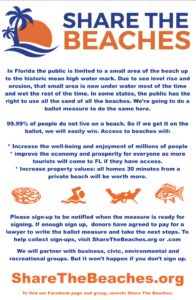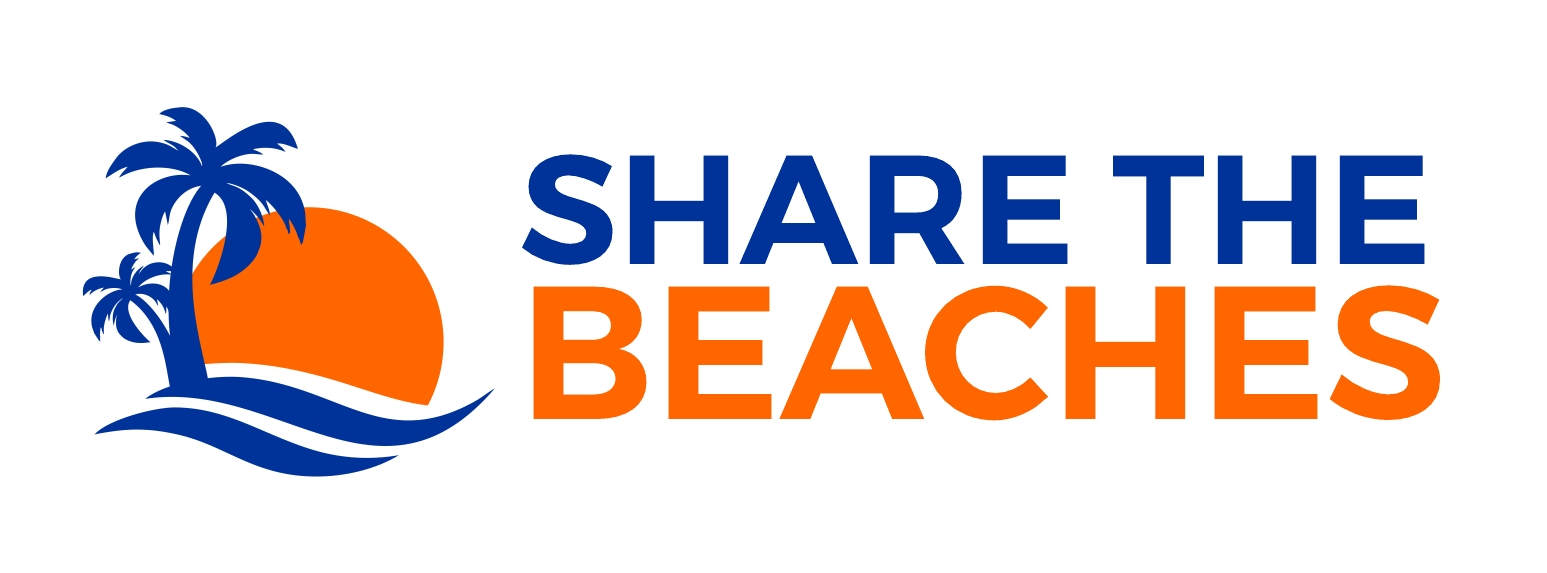Give the public access to Florida’s beaches
In other states like North Carolina, Hawaii and Oregon, the public has the right to use all beaches. People in Florida deserve the same.
THE SITUATION
Though the Florida Constitution says the public should have the right to use the beaches, in practice we don’t yet really have that right. This is because we now only have the right to use the sand up to the mean high-water mark. By definition, mean high water mark means that the part we can use is underwater about half the time. The other half of the time it is often wet from having been recently underwater. Nobody goes to the beach with the intention of putting their dry towel down on wet sand.
That’s where a tiny bit of help from you is key. Please sign up to be notified when the ballot measure is ready for signatures. Once there are enough, we and others will pay a lawyer to write the ballot measure and take the next steps. We’ll notify you of ways to sign the petition to get it on the ballot. This will include a file you can download and sign. So if you’re a Florida resident, please take 10 seconds and sign up here:
Sign up to be notified
Coming soon: {___________________________________] { Submit }
Downloadable flier / yard sign
In the near future, we’ll upload a high resolution image of the graphic below, which you can download and print as a flier or a yard sign … or as a sign to have at the beach with you that beachgoers will walk by and read.

9 reasons to amend the law
Changing the law will have these benefits to you and the public:
- CREATE JOBS AND PROSPERITY: It will help tourism and the Florida economy. Beaches are the primary tourist attraction in Florida. If tourists have greater access to beaches, they’ll choose Florida over other places. This will increase jobs and prosperity. We very much need both due to the pandemic.
- INCREASE PROPERTY VALUES: It will increase property values for most Florida homeowners. Anyone who lives within 30 minutes of a restricted beach that becomes accessible to the public will see a gain in their property value. More people will want to buy it and more people will want to rent it.
- PROTECT AGAINST ABUSES: Rich owners of beachfront property have become unreasonable, frequently harassing members of the public who try to peacefully enjoy the wet sand portion of the beach they have the right to use. Many have also erected barriers to impede the public from traversing the section of the beach the public is supposed to have access to.
- THE CURRENT LAW IS OUTDATED: Mean high-water marks are based on a 19-year average, so they’re very outdated. In the last 15 years, sea levels have risen significantly and beaches have eroded a lot. So in the majority of beaches, the mean high-water mark is under water for 90% of the day or more.
- MEAN HIGH-WATER MARKS AREN’T ADEQUATE: Even if just the current year’s mean high water mark were used, it would mean that the public use area would be fully underwater for about 50% of the day. That means that half of the time you want to go to the beach, you can’t. The other half of the time, you’d be lying on a wet towel from the sand being recently submerged.
- CORRECT THE BUNGLED WORK OF POLITICIANS: The FL legislature passed a confusing law in 2018 that greatly affects the public’s right to public access. Before 2018, if property owners wanted to block the public, they had to file suit against beachgoers and prove that their beach had not been customarily used by the public in the past. Now, beachgoers need to file an expensive lawsuit against homeowners, and then prove that the public has had uninterrupted access since ancient times. Most people can’t afford to file these lawsuits.
- HONOR THE CONSTITUTION: The Florida Constitution says that the public should have the right to use the beaches. But in practice it is not happening. This is in part because the current wording is too vague, and in part because politicians have favored the .1% of rich waterfront owners to the detriment of the 99.9% of the rest of us, We need specifics added to the law to firmly and clearly establish the public’s ability to use the beaches.
- REWARD HARD-WORKING TAXPAYERS: The 99.99% of us who don’t own beachfront property pay most of the real estate taxes in our state and our counties. We work very hard to earn our money and pay our taxes. We should be able to easily enjoy a day at the beach on our day off. When our friends or family come to visit, they should be able to also.
- IMPROVE WELL-BEING AND MENTAL HEALTH: Studies have shown that walking or swimming in nature for even 15 minutes twice a week significantly helps the well-being of people, including less anxiety and depression. That means happier families and marriages, increased work productivity and less violence. Most Florida communities don’t have many public nature parks, but they do have existing beaches. It’s time that we use them to help our communities and not just a chosen few.
Our TEAM MEMBERS (these are stock photos, not our team photos yet)

Tina Farnsworth

David Perkins

elizabeth lee



